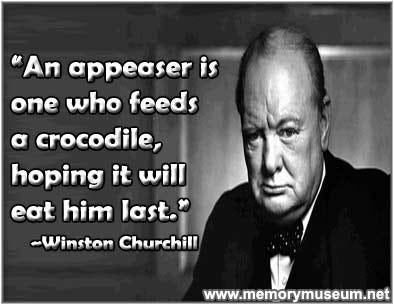Appeasement

I got some excellent questions from a friend about my previous post that I thought would be best to answer here:
Chamberlain must have had opponents while he was appeasing Hitler, do you know who they were and what they had to say?
What was public opinion at the time? Were people (Britain and North America and other western countries) unaware of what was happening or did they ignore it because it was happening elsewhere.
Did the west truly fight the idea of fascism or was that a by-product of the success of winning the war?
The answers to the questions are quite depressing. They are also not that hard to find. To answer the first question, the Wikipedia entry on Chamberlain is a good start. Once you look at the list of short and long videos when searching Churchill vs Chamberlain on Youtube, you will realize that this question is controversial to this day. Watching the Intelligence Squared debate on the subject will show the hopeless division between the two sides. You will find there an eerie resemblance to the division we have today between the appeasers of Islam (such as our Prime Minister) and those who are alarmed by the danger it represent. The short answer to your question is yes, Chamberlain did have opposition (most notably Churchill) but they were outnumbered by the appeasers. What did he have to say? Here are some quotes:
“Britain has been offered a choice between war and shame. She has chosen shame and will get war.” (Churchill on Neville Chamberlain and the Munich accord in 1938)
“He looked at foreign affairs through the wrong end of a municipal drainpipe.” (Churchill on Chamberlain)
“He who seeks to buy the friendship of an enemy with concessions will never be rich enough.” (Bismark)
As to your second question, the public wanted peace. The beginning of World war II was less then a generation away from the end of the first which was the ugliest war in history. The public also had a perverse fascination with the strong-man types of fascism and communism. Mussolini was the darling of international politics. He made the trains run on time! The public was also fascinated with Hitler and Stalin. The US congress voted down any action against the Germans. The US made tons of money on trading with the Germans, which did not change until the onset of the Battle of Britain in 1940. Joseph Kennedy Sr. exemplifies perfectly the American Position at the time. Just as you suggested, fascism was something that happened somewhere else and some aspects of it were quite likeable anyway. The people who warned against the dangers were in a minority and were shouted down just as the “islamophobes” and the ‘xenophobes’ are today. Besides, the economies of the fascist countries, thanks to the rearmament effort, were booming. For many around the world they looked like viable models. Yes, they were a little rough on the Jews, but nobody wanted those people anyway. So the answer to your second question is all of the above. The majority was ignorant of the dangers and the few who understood it were powerless to do anything about it. The most interesting one is your third question and the answer is no. The West never truly fought the central ideas of fascism. Only some elements of it and only after it was defeated. Progressivism and the New-Deal was America’s version of fascism. Jonah Goldberg wrote a fantastic book about it titled Liberal fascism. Hayek’s “The Road to Serfdom” was written during the war and Mises was so focused on communism that he did not see the threat of fascism clearly. There was no clearly articulated opposition to the ideas of fascism. What I meant in the post is the way we condemn it now. I meant the contempt we have today for what we think fascism was. It seems that we are very good kicking something that is already down but lack the courage to stand up to the threat staring into our face. I believe that a confrontation between western liberal values and the dubious ‘values’ of sharia is inevitable. The longer we go on pretending that we can avoid it through appeasement and accommodation, the uglier the conflict will be.



